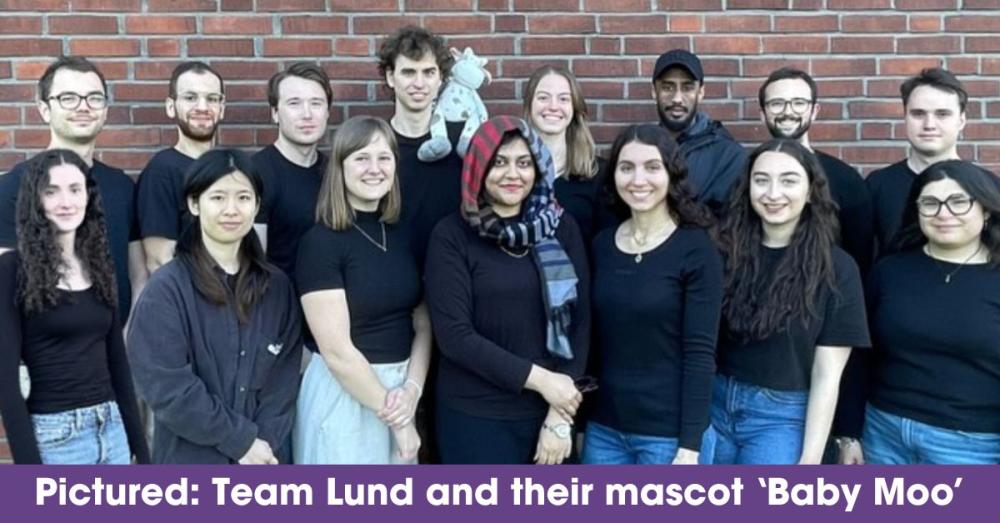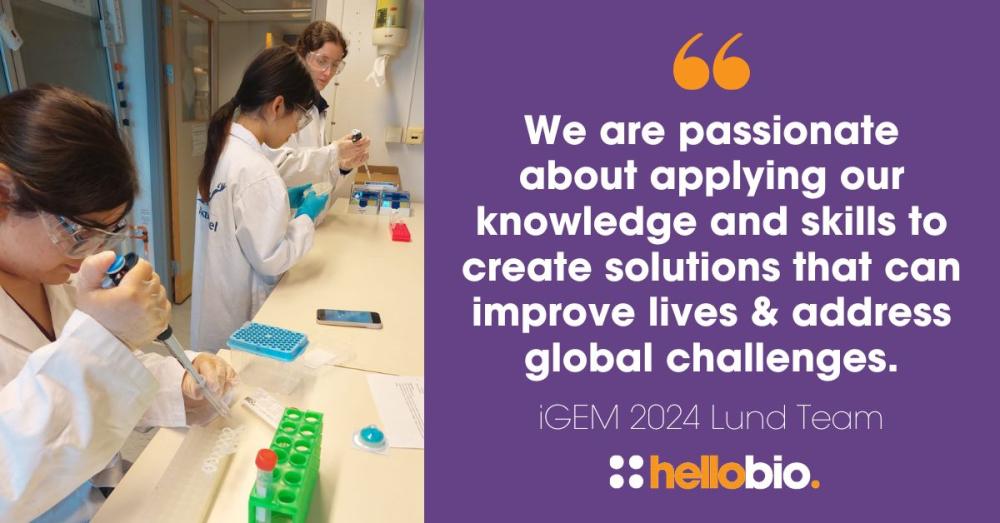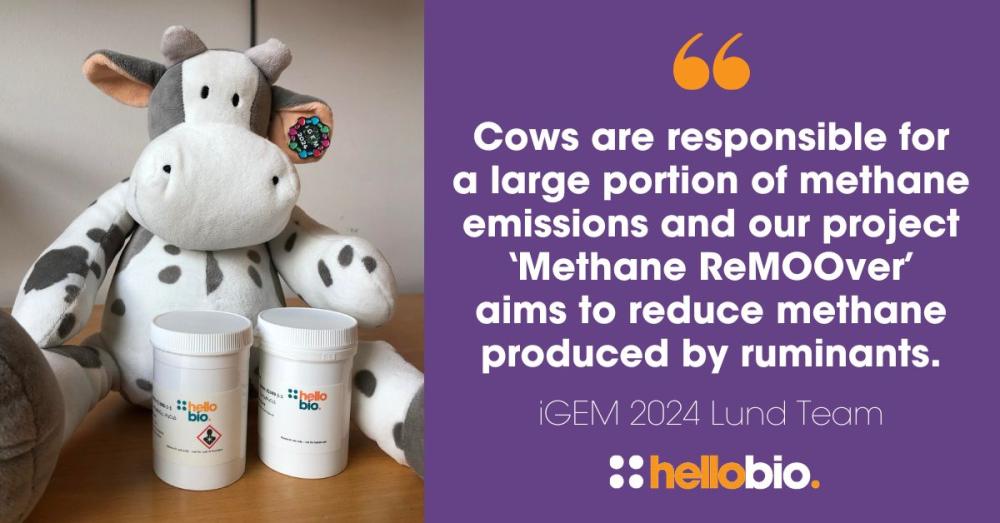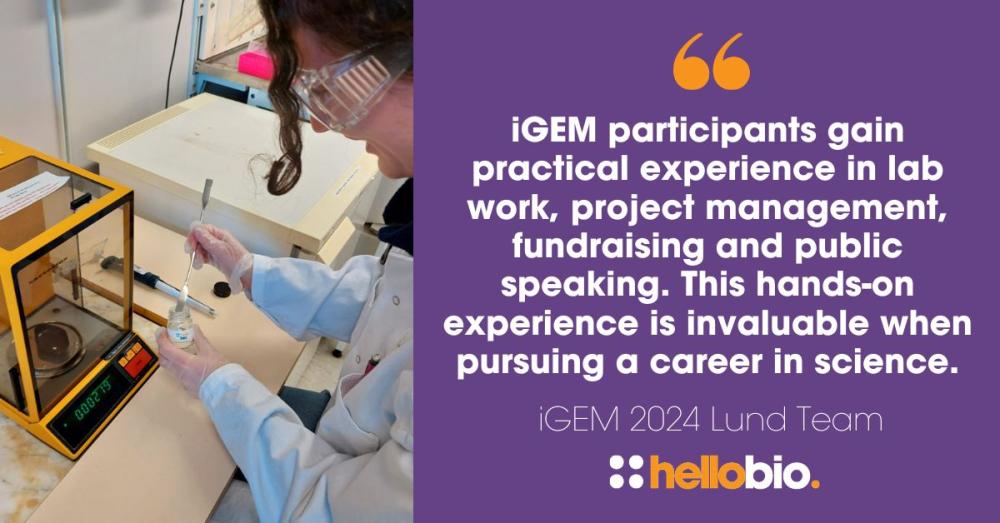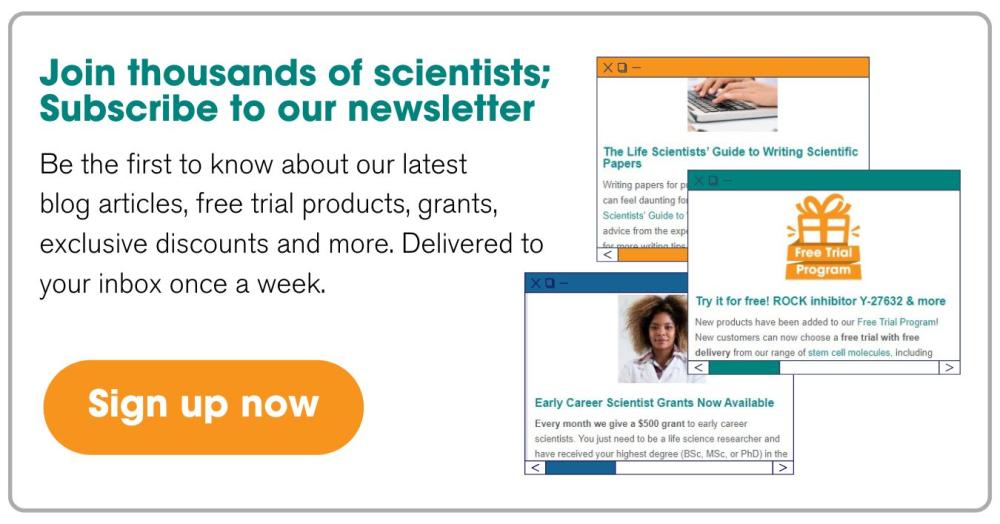iGEM 2024: The Race to Reduce Methane Emissions
The annual iGEM synthetic biology competition is off and running for 2024, and Hello Bio are delighted to be sponsoring one of the 430+ teams taking part in this year’s challenge!
Last month we were approached by the team at Lund University in Sweden for support with their 2024 application. The competition challenges teams from universities and research institutes around the world to find a solution to a real-world problem, and we were delighted to help Lund by providing them with consumables to use in their wet lab research!
We were excited to find out more about the competition, so we spoke to the team about their background in science, the problem they will be tackling, and why competitions like this are so important for the future of science…
Can you tell us a little about your background as science students at Lund University?
We are a student-led non-profit group composed of 15 enthusiastic Bachelor and Master students from 9 different countries and 3 continents. Our team, located at Lund University, has diverse backgrounds in Biotechnology, Bioinformatics, Biochemistry, and Computer Science. We met during the synthetic biology course, recognizing the potential of engineering microorganisms to endow them with new properties to solve real world problems. Since then, we have been brainstorming, planning, and designing our project, and we are now beginning to test our idea in the lab.
What is the iGEM competition and how long has it been running?
iGEM stands for International Genetically Engineered Machine and is an annual international competition based on synthetic biology where teams, consisting of students from high schools and universities, design and build genetically engineered systems using biological parts to create organisms with new and improved properties. iGEM encourages participants from diverse fields such as biology, engineering, and computer science, to work together for the same goal - find a solution to a real-life problem using synthetic biology. Teams present their projects at the iGEM Giant Jamboree, where they are evaluated based on various criteria including innovation, safety, and impact to society. Initially, iGEM started in January 2003 as a study course at the Massachusetts Institute of Technology. It became a summer competition in 2004, and the first official iGEM competition was held that year. Since then, it has grown significantly, attracting teams from around the world.
What inspired you to get involved with the competition?
Our curiosity drives us to explore new ideas and iGEM provides the ideal platform to do so. The competition encourages us to think creatively and innovatively, challenging us to develop novel solutions to real-world problems. Our motivation is driven by our commitment to making a difference through science. We are passionate about applying our knowledge and skills to create solutions that can improve lives and address global challenges. iGEM gives us the chance to turn our passion into action and has fueled our desire to push the boundaries of what is possible in synthetic biology.
How many people will take part in this year’s competition?
Over 400 teams are expected to participate, representing various universities and research institutions globally. The competition is organized into several categories based on the nature of the projects, such as Environment, Health, Food & Nutrition, and more. Sweden is actively participating in the iGEM 2024 competition with several teams from different universities such as Lund, Gothenburg, Stockholm, Linkoping and Uppsala.
What is your project theme, and why was this chosen?
Climate change poses a direct threat to mankind and the environment. Thus, emissions of greenhouse gases need to be reduced in every sector. Methane has a severe climate change impact and its concentration in the atmosphere is continuously rising. Cows are responsible for a large portion of methane emissions through enteric fermentation as a by-product. Our project ‘’Methane ReMOOver’’ aims to reduce methane emissions produced by ruminants. This will be accomplished by synthetically engineering the bacterium Cupriavidus necator that can live in the cow's rumen with genes that produce inhibitors for the methanogenesis pathway. We aim to tackle the methane emission problem using a dual approach. Firstly, the chosen bacteria will compete for resources, mainly H2 and CO2 , with methanogens. Secondly, the synthetically engineered bacteria will produce competitive inhibitors, mainly bromoform, for methane inhibition.
What previous topics have been tackled in the competition?
A wide variety of topics have been addressed over the years. Many teams have focused on ‘’Food’’ and ‘’Agriculture’’, working on enhancing crop yield and resistance to pests through genetic engineering to improve food production and ensure agricultural sustainability. Another well-known category is ‘’Bioremediation’’, where teams have developed projects aimed at using engineered organisms to clean up pollutants such as heavy metals and plastics to restore contaminated environments. The "Therapeutics" and "Diagnostics" categories cover a wide range of projects focused on health and medicine. For example, developing biosensors to detect specific pathogens using engineered microbes or proteins. Another example is creating new drugs using synthetic biology techniques, such as engineering microbes to produce pharmaceuticals.
Why are problem-solving competitions like this so important for the future of science?
Competitions like iGEM provide a platform for students to apply theoretical knowledge to solve world problems with innovative thinking. Participants gain practical experience in the laboratory, project management, fundraising, and public speaking. This hands-on experience is invaluable when pursuing a career in science. Several projects developed in these competitions have been turned into successful startups, translating the original ideas into a real world application. These companies reflect the competition's emphasis on innovation and creativity.
What are you most looking forward to about this year’s competition?
Being part of iGEM allows us to connect with a global network of students, mentors, and professionals who share our passion for synthetic biology. We are excited to exchange ideas, gain insights, and receive feedback from experts and peers, enriching our learning experience. We are also excited to present our project at the iGEM Giant Jamboree, where we will showcase our hard work and achievements. We aim to demonstrate how a minor modification can address an urgent problem. Additionally, we look forward to the opportunity for recognition and constructive feedback on our work.
How can our readers follow your progress?
To find out more about our project and stay updated on our progress, readers can engage with us on our social media platforms. We actively post updates, photos, videos, insights into our research process and other content related to our project on Instagram. Readers can follow us on:
- Instagram: igem_lund
- Facebook: iGEM Team Lund
- LinkedIn: iGEM Lund
Moreover, our wiki page will include all the information about our project, including background, objectives, methods, results, team members and more. This wiki page is currently in the making and will serve as a primary source of information about our project with the iGEM community and the public. By utilizing these channels, we aim to make our project accessible for a wide audience, including students, researchers or anyone interested in synthetic biology. We encourage readers to follow us on social media and join us on our journey of scientific discovery and innovation!
________________________________
If you enjoyed this article, why not check out the other resources available on our blog. We are passionate about supporting life scientists including early career life scientists and PhD students - with really low-priced reagents, antibodies and biochemicals, early career scientist grants, and resources to help with both personal and professional development. We know how tough it is - so we hope you find these helpful!
More General Support for Life Scientists
For advice on wellbeing, dissertations, presenting at conferences, wellbeing, PhD support, networking and lots more, we have a huge range of articles to help - just click below:
Save up to 50% on our high purity reagents...
When you get to the stage of planning your experiments, don't forget that we offer a range of low-cost, high-purity agonists, antagonists, inhibitors, activators, antibodies and fluorescent tools (yes - they really are around half the price of other suppliers!) You can use our Quick Multi-Search Tool to search for lots of products in one go, and the range includes:
- Enzyme inhibitors and activators
- Chemogenetic ligands
- Ion channel modulators
- GPCR & ionotropic receptor ligands
- Cell biology reagents & biochemicals
Technical resources
Try our Molarity Calculator: a quick and easy way to calculate the mass, volume or concentration required for making a solution.
Try our Dilution Calculator: an easy way to work out how to dilute stock solutions of known concentrations
We also offer a comprehensive range of technical resources including antibody protocols and methods, product guides and mini-reviews:
And finally, don't forget to check back in with our blog regularly for our latest articles. If there’s something you’d love to contribute to the community, whether that’s an interview or article, drop us a line at hello@hellobio.com
---






